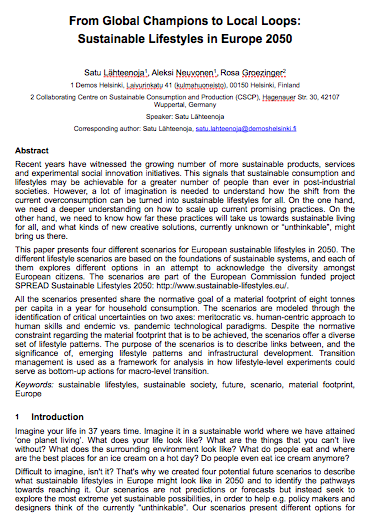Imagining how life would look like in a sustainable world where ‘one planet living’ has been attained might be difficult. That's why we created four potential future scenarios to describe what sustainable lifestyles in Europe might look like in 2050 and to identify the pathways towards reaching it. Our scenarios are not predictions or forecasts but instead seek to explore the most extreme yet sustainable possibilities, in order to help e.g. policy makers and designers think of the currently “unthinkable”.
Recent years have witnessed the growing number of more sustainable products, services and experimental social innovation initiatives. This signals that sustainable consumption and lifestyles may be achievable for a greater number of people than ever in post-industrial societies. However, a lot of imagination is needed to understand how the shift from the current overconsumption can be turned into sustainable lifestyles for all. On the one hand, we need a deeper understanding on how to scale up current promising practices. On the other hand, we need to know how far these practices will take us towards sustainable living for all, and what kinds of new creative solutions, currently unknown or “unthinkable”, might bring us there.
This paper presents four different scenarios for European sustainable lifestyles in 2050. The different lifestyle scenarios are based on the foundations of sustainable systems, and each of them explores different options in an attempt to acknowledge the diversity amongst European citizens. The scenarios are part of the European Commission funded project SPREAD Sustainable Lifestyles 2050.
All the scenarios presented share the normative goal of a material footprint of eight tonnes per capita in a year for household consumption. The scenarios are modeled through the identification of critical uncertainties on two axes: meritocratic vs. human-centric approach to human skills and endemic vs. pandemic technological paradigms. Despite the normative constraint regarding the material footprint that is to be achieved, the scenarios offer a diverse set of lifestyle patterns. The purpose of the scenarios is to describe links between, and the significance of, emerging lifestyle patterns and infrastructural development. Transition management is used as a framework for analysis in how lifestyle-level experiments could serve as bottom-up actions for macro-level transition.
Conference paper presented in World Resources Forum Davos 2013. By Satu Lähteenoja, Aleksi Neuvonen and Rosa Groezinger.

